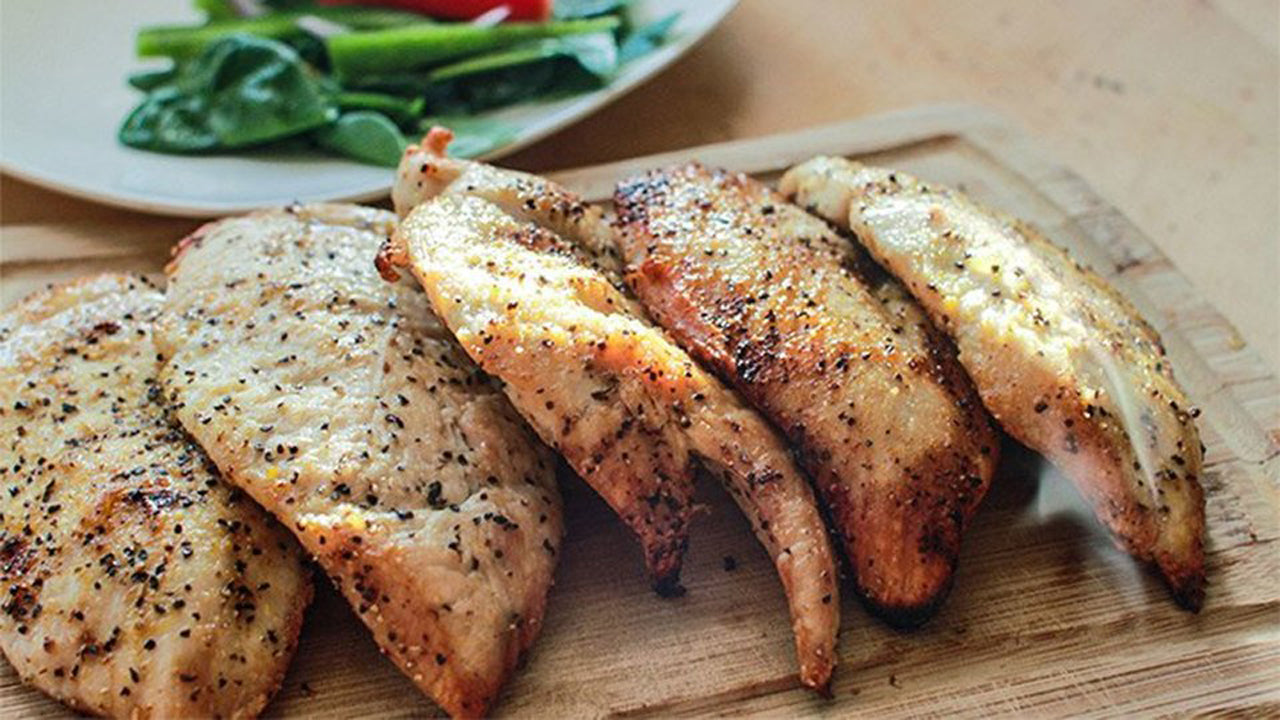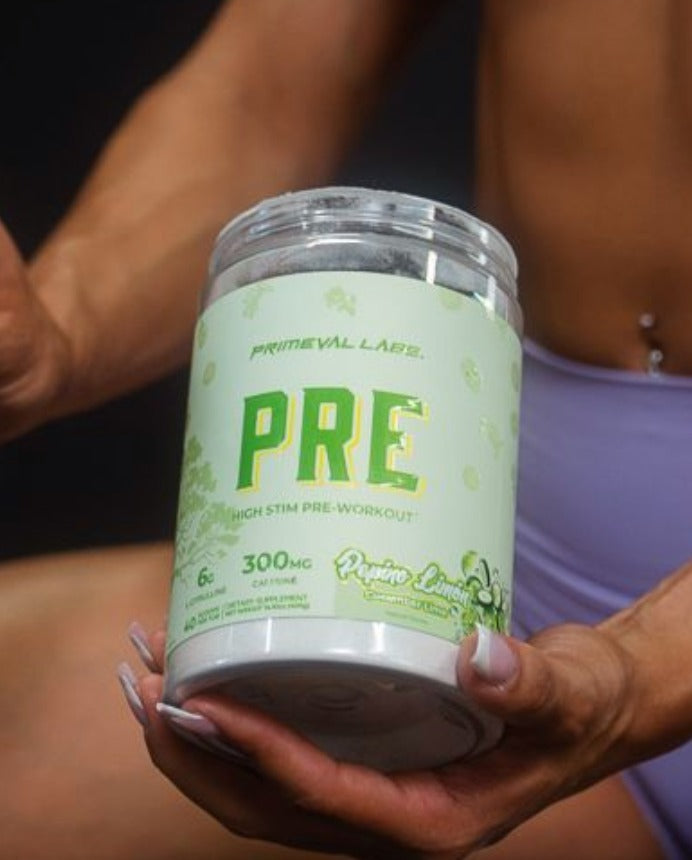Weight loss is a goal shared by millions of people around the globe.
Despite good intentions, a significant portion of these millions struggle to lose weight, and if they do, there’s a high probability they will regain most of the weight they initially lost.
The reasons for this are many, but perhaps the biggest reason people struggle to lose weight safely and effectively is due to the tremendous amount of bad dieting advice there is on the internet.
That ends today as we present 10 weight loss tips that are backed by science.
Let’s get started!
Top 10 Research-Backed Weight Loss Tips
Use Smaller Plates
We’ve all seen the enormous-sized dinner plates restaurants and buffets use to feed their customers.
Without realizing it, this supersized plate is encouraging you to eat more calories.
Research shows that using smaller plates may help some individuals to effortlessly reduce their calorie intake at meal time.[1]
However, this effect doesn’t apply to everyone. It seems to be more effective in overweight individuals than leaner ones.[2]
Don’t Eat in Front of the TV
In addition to eating from larger portion containers (i.e. big dinner plates), being distracted while eating has also been found to increase food intake.
This is more common than ever these days as more and more individuals watch tv, scroll through social media, or read their smartphones/tablets while eating.
Research has shown that distracted eating not only increases calorie intake during the distracted meal but also at subsequent meals.[4]
On the flip side, being more mindful and present during mealtime (i.e. focusing on what you’re eating and/or the conversations you’re having with others at the dinner table) can help you be more cognizant of how much you’re eating, making you less likely to overeat.[5]
Eat Fruits and Vegetables
This one may seem rather obvious, but the truth is that a vast majority of the population does not consume the daily recommended servings of fruits and vegetables.[9]
In addition to supplying the body with essential vitamins, minerals, and antioxidants, fruits and vegetables also help weight loss by increasing fullness.
The reason that fruits and veggies help quash hunger is due to their fiber and water content, which help you to feel full.
As an added bonus, these foods also contain relatively few calories compared to typical snack options, which helps keep overall calorie intake in check.
And, research notes that individuals with higher intakes of fruits and vegetables tend to weigh less.[10]
Keep Healthy Food Front & Center
Craving a snack during the day is something we all encounter from time to time, especially if we’re in the middle of a weight loss phase.
When hunger strikes, it’s incredibly tempting to grab hold of the food immediately in front of you and chow down. For many, the option closest to them is a bag of chips, cookies, or candy.
However, these foods are very dense in calories and do little to actually satisfy hunger.
Placing healthier snacks in open, easily visible, accessible areas gives you a lower calorie option that helps satisfy your snack craving while keeping you on track with your weight loss goals.
Research notes that snack foods high in protein and fiber help ablate hunger, which prevents you from consuming too many calories, thus ruining your diet.[6]
Some great handheld healthy snack options are hard-boiled eggs, fresh fruit, sliced veggies, greek yogurt, and nuts.
Eat Spicy Food
Capsaicin is the pungent alkaloid that gives chile peppers their distinct bite.
In addition to setting your mouth ablaze in a fiery inferno, capsaicin also has been noted to help reduce appetite and boost metabolism.[7,8]
The hunger-suppressing effects of capsaicin are one major reason we included it in Pyretic Black.
Sleep 7-9 Hours Each Night
Sleep may be the most underrated player in the weight loss game.
Yes, diet and exercise are important, but sleep can affect both of those pillars of fat loss.
Sleep deprivation reduces motivation to exercise and decreases energy expenditure the following day.
Moreover, not getting sufficient sleep has also been shown to disrupt energy metabolization and nutrient storage. It also affects the body’s natural hunger and satiety cues, making individuals feel less full following a meal and craving higher-calorie fare.[11]
Research also notes a strong link between poor sleep and an increased risk of obesity in children and adults.[12]
Eat a High Protein Diet
Protein is a many splendored thing.
It provides the building blocks the body needs to repair and grow. It tastes delicious, and it can also help with weight loss.
For starters, protein is the most expensive macronutrient to digest, meaning the body burns a higher number of calories breaking down and absorbing foods high in protein compared to foods high in carbs or fats.
Seconds, protein is highly satiating, which means it helps keep you full.
Research finds that individuals who eat 25% of their daily calories from protein reduced obsessive thoughts about food by 60% while also reducing the desire to snack late at night.[13]
High protein diets are also better for preserving lean muscle mass during weight loss phases too[14], which benefits body composition and metabolism.
If you have trouble consuming enough protein each day, Primeval Labs offers two delicious protein powders in WHEY and ISOLIT to help individuals meet their daily needs.
Lift Weights
When it comes to exercise and weight loss, the default option for many is to perform endless hours of cardio.
While aerobic exercise (“cardio”) can help increase energy expenditure during the day, it shouldn’t be the primary vehicle driving fat loss -- a calorie deficit is.
Cardio also does very little to help build or retain lean mass.
The reason you want to build or maintain muscle while dieting is that it can help keep your metabolism higher, allowing you to consume a higher amount of calories while still losing weight.
The best way to build muscle is through resistance training (such as lifting weights).
Research indicates that resistance training while dieting can help prevent muscle loss and boost metabolism.[15,16]
Track Your Calories
As simple as it may seem, tracking your nutrition (i.e. counting calories) can be incredibly helpful when trying to lose weight.
As we all know, calories are king when it comes to weight loss, meaning that you have to be in a calorie deficit in order to lose weight.
The only way to know with any reasonable degree of certainty whether or not you are actually in an energy deficit is to count calories -- what foods you eat and how much food you eat.
Research shows that keeping a food diary can help you lose weight.[17]
There are any number of smartphone apps available to help you track your calories on the go, or you can go old school and use a paper and pen to write down your meals by hand.
Whichever method you choose, the important thing is keeping an eye on what you eat and how much you eat.
Take Your Time Eating
In the haste to get everything done in a day that needs doing, many of us scarf down our meals (usually while watching TV or working).
While you might be getting mealtime out of the way sooner than you think, the truth is that you might actually be setting yourself up to consume more calories.
The reason for this is that it takes the brain some time to register that you've had enough to eat.
Research finds that taking your time while eating and chewing your food more slowly and thoroughly can reduce calorie intake and give the hormones produced by your GI tract time to reach the brain and tell it you’ve had enough to eat.[18,19]
References
- Wansink, B., & van Ittersum, K. (2013). Portion size me: plate-size induced consumption norms and win-win solutions for reducing food intake and waste. Journal of Experimental Psychology. Applied, 19(4), 320–332. https://doi.org/10.1037/a0035053
- Robinson, E., Nolan, S., Tudur-Smith, C., Boyland, E. J., Harrold, J. A., Hardman, C. A., & Halford, J. C. G. (2014). Will smaller plates lead to smaller waists? A systematic review and meta-analysis of the effect that experimental manipulation of dishware size has on energy consumption. Obesity Reviews : An Official Journal of the International Association for the Study of Obesity, 15(10), 812–821. https://doi.org/10.1111/obr.12200
- Rosenthal, R., & Raynor, H. (2017). The effect of television watching and portion size on intake during a meal. Appetite, 117, 191–196. https://doi.org/10.1016/j.appet.2017.06.030
- Robinson E, Aveyard P, Daley A, et al. Eating attentively: a systematic review and meta-analysis of the effect of food intake memory and awareness on eating. Am J Clin Nutr. 2013;97(4):728‐742. doi:10.3945/ajcn.112.045245
- Katterman SN, Kleinman BM, Hood MM, Nackers LM, Corsica JA. “Mindfulness meditation as an intervention for binge eating, emotional eating, and weight loss: A systematic review.” Eating Behaviors. April 2014. 15(2):197-204
- Njike VY, Smith TM, Shuval O, et al. Snack Food, Satiety, and Weight. Adv Nutr. 2016;7(5):866‐878. Published 2016 Sep 15. doi:10.3945/an.115.009340
- Ludy MJ, Mattes RD. The effects of hedonically acceptable red pepper doses on thermogenesis and appetite. Physiol Behav. 2011;102(3-4):251‐258. doi:10.1016/j.physbeh.2010.11.018
- Reinbach, H. C., Smeets, A., Martinussen, T., Moller, P., & Westerterp-Plantenga, M. S. (2009). Effects of capsaicin, green tea and CH-19 sweet pepper on appetite and energy intake in humans in negative and positive energy balance. Clinical Nutrition (Edinburgh, Scotland), 28(3), 260–265. https://doi.org/10.1016/j.clnu.2009.01.010
- https://www.cdc.gov/media/releases/2017/p1116-fruit-vegetable-consumption.html
- Ledoux, T. A., Hingle, M. D., & Baranowski, T. (2011). Relationship of fruit and vegetable intake with adiposity: a systematic review. Obesity Reviews : An Official Journal of the International Association for the Study of Obesity, 12(5), e143-50. https://doi.org/10.1111/j.1467-789X.2010.00786.x
- Schmid, S. M., Hallschmid, M., Jauch-Chara, K., Born, J., & Schultes, B. (2008). A single night of sleep deprivation increases ghrelin levels and feelings of hunger in normal-weight healthy men. Journal of Sleep Research, 17(3), 331–334. https://doi.org/10.1111/j.1365-2869.2008.00662.x
- Cappuccio FP, Taggart FM, Kandala NB, et al. Meta-analysis of short sleep duration and obesity in children and adults. Sleep. 2008;31(5):619‐626. doi:10.1093/sleep/31.5.619
- Leidy HJ, Tang M, Armstrong CL, Martin CB, Campbell WW. The effects of consuming frequent, higher protein meals on appetite and satiety during weight loss in overweight/obese men. Obesity (Silver Spring). 2011;19(4):818‐824. doi:10.1038/oby.2010.203
- Wycherley, T. P., Moran, L. J., Clifton, P. M., Noakes, M., & Brinkworth, G. D. (2012). Effects of energy-restricted high-protein, low-fat compared with standard-protein, low-fat diets: a meta-analysis of randomized controlled trials. The American Journal of Clinical Nutrition, 96(6), 1281–1298. https://doi.org/10.3945/ajcn.112.044321
- Hunter, G. R., Byrne, N. M., Sirikul, B., Fernandez, J. R., Zuckerman, P. A., Darnell, B. E., & Gower, B. A. (2008). Resistance training conserves fat-free mass and resting energy expenditure following weight loss. Obesity (Silver Spring, Md.), 16(5), 1045–1051. https://doi.org/10.1038/oby.2008.38
- Marks, B. L., Ward, A., Morris, D. H., Castellani, J., & Rippe, J. M. (1995). Fat-free mass is maintained in women following a moderate diet and exercise program. Medicine and Science in Sports and Exercise, 27(9), 1243–1251.
- Burke LE, Wang J, Sevick MA. Self-monitoring in weight loss: a systematic review of the literature. J Am Diet Assoc. 2011;111(1):92‐102. doi:10.1016/j.jada.2010.10.008
- Andrade, A. M., Greene, G. W., & Melanson, K. J. (2008). Eating slowly led to decreases in energy intake within meals in healthy women. Journal of the American Dietetic Association, 108(7), 1186–1191. https://doi.org/10.1016/j.jada.2008.04.026
- Borvornparadorn, M., Sapampai, V., Champakerdsap, C., Kurupakorn, W., & Sapwarobol, S. (2019). Increased chewing reduces energy intake, but not postprandial glucose and insulin, in healthy weight and overweight young adults. Nutrition & Dietetics: The Journal of the Dietitians Association of Australia, 76(1), 89–94. https://doi.org/10.1111/1747-0080.12433














Leave a comment
This site is protected by hCaptcha and the hCaptcha Privacy Policy and Terms of Service apply.